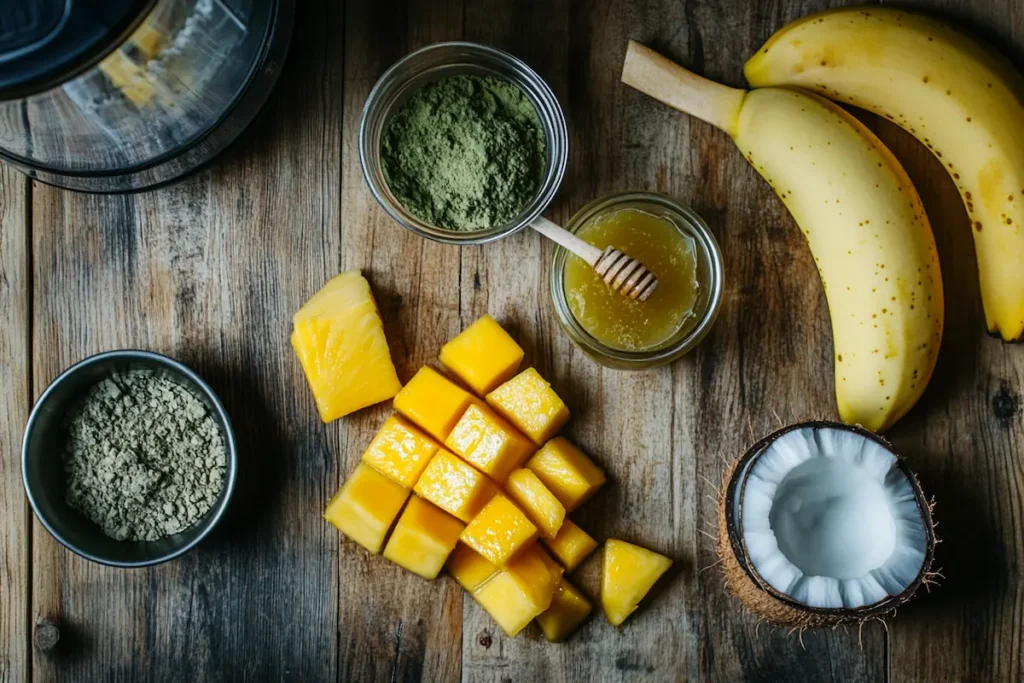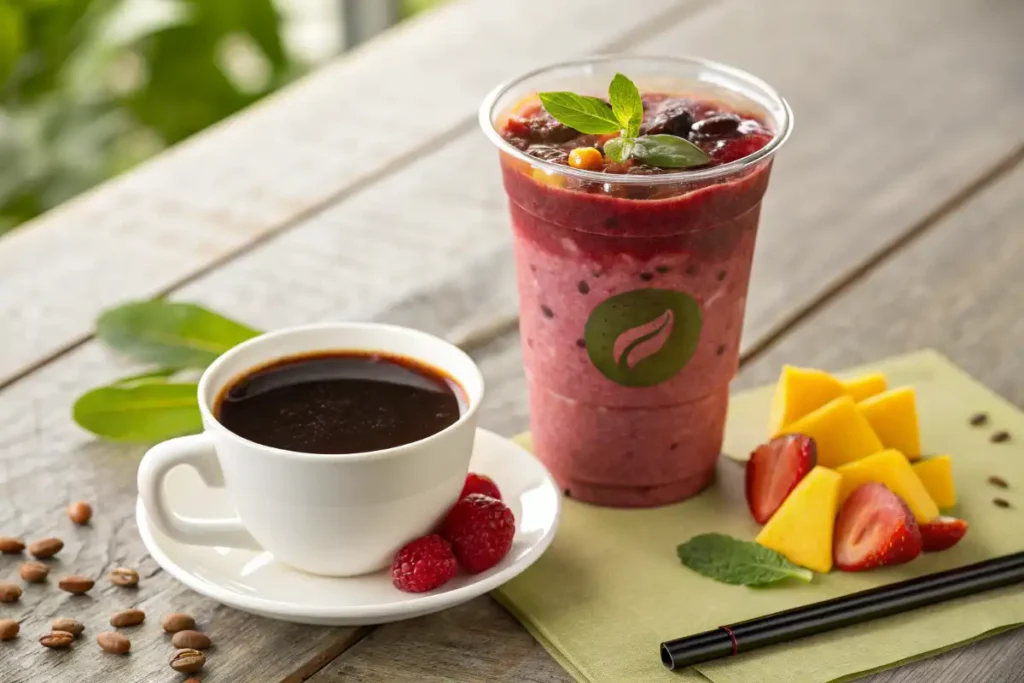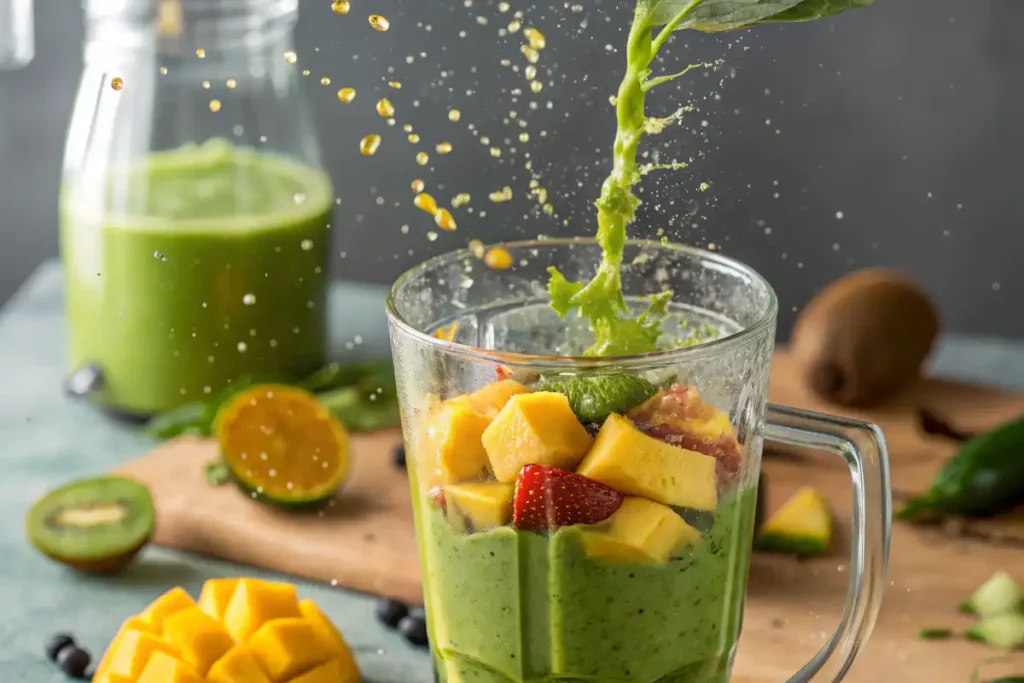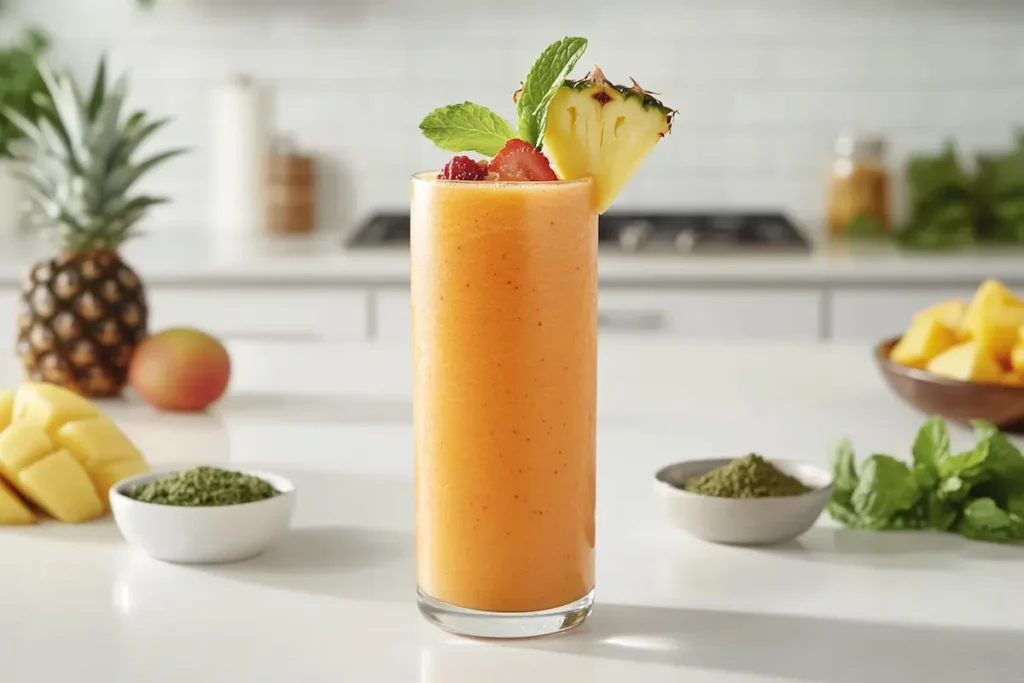Introduction
The Tropical Smoothie Energizer is a popular choice for those needing a quick energy boost in a delicious, refreshing form. With its vibrant flavors and energizing qualities, it’s often a go-to for busy mornings or mid-afternoon slumps. But how much caffeine does it contain, and is it a healthy option for regular use?
In this article, we’ll uncover the caffeine content of the Tropical Smoothie Energizer, along with its benefits and potential downsides. You’ll also learn how it fits into a balanced diet and discover tips for making homemade alternatives that provide a similar energy boost. Whether you’re a tropical smoothie fan or just curious, this guide will help you make an informed decision. Let’s dive in!
How Much Caffeine is in a Tropical Smoothie Energizer?
What Ingredients in the Tropical Smoothie Energizer Contain Caffeine?

The Tropical Smoothie Energizer gets its caffeine from natural sources like green tea extract, coffee concentrate, or energy-boosting supplements included in the mix. Green tea extract offers a mild and steady energy release, while coffee concentrate delivers a stronger caffeine kick. Along with providing energy, these ingredients also contribute antioxidants and other health-promoting compounds.
On average, a serving of the Tropical Smoothie Energizer contains approximately 60–80 mg of caffeine, depending on the specific recipe and portion size. This level is enough to provide a noticeable energy lift without being overwhelming for most individuals. However, the exact caffeine amount may vary across different stores or homemade versions, so it’s worth checking with your local provider if you have specific dietary concerns.
Comparing the Caffeine Content of Tropical Smoothie Energizer to Coffee and Tea
For context, a standard cup of coffee contains around 95 mg of caffeine, which is slightly higher than the amount in the Tropical Smoothie Energizer. In comparison, a cup of green tea typically provides 30–50 mg of caffeine, positioning the Energizer’s caffeine content somewhere in the middle of this range.
Unlike coffee, which can sometimes cause jitters or a sharp energy spike followed by a crash, the Energizer’s caffeine is often paired with natural sugars, fiber, and nutrients from fruits. This combination promotes a more gradual energy boost and sustained alertness. For those who find coffee too intense or are looking for a flavorful alternative, the Tropical Smoothie Energizer offers a balanced and refreshing option.
Comparing the Caffeine Content of Tropical Smoothie Energizer to Coffee and Tea
How Caffeine in Smoothies Boosts Energy Levels
Caffeine is a natural stimulant that boosts energy, making it perfect for pre-workout or busy days. It stimulates the central nervous system, increasing alertness and reducing fatigue. A caffeine-infused smoothie like the Tropical Smoothie Energizer provides a quick energy boost without the heaviness of a full meal.
Does Caffeine in the Tropical Smoothie Energizer Improve Focus and Alertness?
In addition to physical energy, caffeine is renowned for enhancing mental clarity and focus. By blocking adenosine receptors in the brain, it helps you feel more awake and alert. This makes caffeine smoothies a fantastic option for morning productivity or an afternoon pick-me-up. Pairing caffeine with nutrient-dense fruits and proteins in a smoothie ensures sustained energy without the jittery side effects often associated with coffee.
Antioxidant Benefits
Caffeine in smoothies often comes from sources like green tea extract, which is rich in antioxidants. These antioxidants, particularly catechins, help combat oxidative stress and support overall health. Including green tea or other antioxidant-rich ingredients in your smoothie not only delivers an energy boost but also contributes to your body’s defense against free radicals. This dual benefit of energy and health makes caffeinated smoothies a smarter choice than many traditional energy drinks.
Drawbacks of Caffeine in Smoothies
Potential Overconsumption of Caffeine
While caffeine can offer many benefits, it’s important to be mindful of your total daily intake. Combining the Tropical Smoothie Energizer with other caffeinated beverages like coffee, tea, or energy drinks can lead to overconsumption. High levels of caffeine may cause side effects such as jitteriness, increased heart rate, or difficulty sleeping. To stay within safe limits, monitor your caffeine intake from all sources and consider opting for smaller serving sizes if needed.
Sugar Content in Energy Smoothies
Many energy smoothies, including the Tropical Smoothie Energizer, may contain added sugars to enhance flavor. While these sugars make the smoothie taste delicious, they can also counteract some of its health benefits. Excessive sugar intake may lead to energy crashes, weight gain, or other health issues. To enjoy the energizing effects without the downsides, choose smoothies with natural sweeteners like fruits or ask for reduced-sugar options when purchasing pre-made smoothies.
Who Should Avoid Caffeine?
Caffeine isn’t suitable for everyone. Children, pregnant or breastfeeding women, and individuals sensitive to caffeine may experience adverse effects even at lower doses. People with certain health conditions, such as anxiety disorders or heart problems, should also limit their intake. If you fall into one of these categories, consider caffeine-free alternatives that still provide an energy boost through nutrient-rich ingredients like bananas, chia seeds, or oats.
Can You Make a Homemade Tropical Smoothie Energizer?

Ingredients for a DIY Energizer Smoothie
Creating your own Tropical Smoothie Energizer at home allows you to control the ingredients and tailor the smoothie to your taste and nutritional needs. Here’s what you’ll need:
- Fresh fruits: Mango, pineapple, and banana for natural sweetness and tropical flavors.
- Green tea: Brewed and cooled, providing a natural source of caffeine and antioxidants.
- Spinach: A handful of fresh spinach adds nutrients like iron and vitamins without altering the taste.
- Optional protein powder: Choose a vanilla or unflavored option to increase the protein content.
- Liquid base: Water, coconut water, or unsweetened almond milk.
- Ice: For a refreshing, chilled texture.
Step-by-Step Recipe
- Prepare the green tea: Brew one cup of green tea and let it cool to room temperature or chill it in the fridge.
- Add fruits: In a blender, combine one cup of mango chunks, half a cup of pineapple chunks, and a small banana.
- Include the spinach: Toss in a handful of fresh spinach for added nutrients.
- Pour the liquid base: Add one cup of your chosen liquid, such as coconut water or almond milk.
- Blend: Blend all ingredients until smooth. If you prefer a thicker smoothie, add more ice or frozen fruits.
- Sweeten if needed: Taste the smoothie and add a teaspoon of honey or a stevia packet for extra sweetness, if desired.
Customizing Your Caffeine Levels
One of the benefits of making your own energizer smoothie is the ability to control the caffeine content:
- Increase caffeine: Use matcha powder instead of brewed green tea for a higher caffeine boost. One teaspoon of matcha adds roughly 70 mg of caffeine.
- Reduce caffeine: Use decaffeinated green tea or reduce the amount of tea in the recipe.
- Add variety: Substitute green tea with a small shot of espresso for a different flavor profile.
Making It Sugar-Free or Low-Calorie
If you’re looking to cut down on sugar or calories, here are a few tips:
- Natural sweeteners: Opt for stevia, monk fruit, or a splash of vanilla extract instead of honey or syrup.
- Liquid alternatives: Use unsweetened almond milk or plain water as your base to keep the calorie count low.
- Fruit adjustments: Limit high-sugar fruits like bananas and replace them with berries, which are lower in sugar.
With these simple steps, you can enjoy a homemade Tropical Smoothie Energizer that’s just as delicious and energizing as the store-bought version—customized perfectly to your needs!
Alternatives to the Tropical Smoothie Energizer

Matcha Smoothie for Energy
If you’re looking for a natural energy boost, a matcha smoothie is an excellent alternative. Matcha powder, made from ground green tea leaves, provides a steady caffeine release along with antioxidants. Blend one teaspoon of matcha powder with almond milk, a handful of spinach, half a banana, and a teaspoon of honey. Add ice for a refreshing texture. This smoothie offers a vibrant green color and sustained energy without the crash associated with sugary drinks.
Coffee-Based Smoothie
For coffee lovers, a cold brew smoothie can be the perfect pick-me-up. Combine half a cup of cold brew coffee with a frozen banana, a tablespoon of almond butter, and a splash of unsweetened almond milk. Add a scoop of chocolate protein powder for a mocha flavor. This smoothie delivers caffeine along with healthy fats and proteins, making it a balanced option for morning or afternoon energy.
Herbal Tea Smoothie
If you prefer a gentler, caffeine-free option, consider an herbal tea smoothie. Brew your favorite herbal tea, such as chamomile or hibiscus, and let it cool. Blend it with mixed berries, a splash of orange juice, and a handful of kale. This smoothie provides hydration, vitamins, and antioxidants without relying on caffeine, making it suitable for evening enjoyment or for those avoiding stimulants.
Protein-Packed Smoothie
For those seeking sustained energy without caffeine, a protein-packed smoothie is a great alternative. Blend a scoop of vanilla or chocolate protein powder with unsweetened almond milk, frozen mango, a handful of spinach, and a tablespoon of flaxseeds. This smoothie delivers essential nutrients and keeps you full for longer, making it ideal for post-workout recovery or a quick meal replacement.
Each of these alternatives offers unique benefits, allowing you to enjoy a customized energy boost tailored to your preferences and lifestyle.
FAQs About Tropical Smoothie Energizer
Does Tropical Smoothie Energizer Have Caffeine?
Yes, the Tropical Smoothie Energizer contains caffeine, typically sourced from ingredients like green tea extract or coffee concentrate. The exact caffeine content can vary depending on the size and specific recipe but generally ranges between 60 to 80 mg per serving. This makes it a moderate source of caffeine compared to a standard cup of coffee, which contains about 95 mg of caffeine per 8 ounces.
What Is the Unhealthiest Smoothie at Tropical Smoothie?
The unhealthiest smoothie at Tropical Smoothie Café is often one with high sugar content and calorie-dense add-ins. Smoothies that include multiple servings of sweetened fruits, syrups, or processed ingredients can pack upwards of 500 to 700 calories and excessive sugar, outweighing the potential health benefits. Always check the nutritional information and opt for smoothies with natural sweeteners or protein-rich ingredients to make a healthier choice.
Is Caffeine an Energizer?
Yes, caffeine is a natural stimulant that acts as an energizer by stimulating the central nervous system. It helps improve alertness, focus, and physical energy levels, making it a popular ingredient in smoothies designed for pre-workout or busy days. However, while caffeine can enhance energy temporarily, overconsumption may lead to side effects like jitteriness, insomnia, or dependency.
Does Tropical Soda Have Caffeine?
Tropical soda options may or may not contain caffeine, depending on the specific flavor or brand. Some tropical sodas include caffeinated ingredients like guarana or green tea extract, while others are entirely caffeine-free. Always check the label or ask for details if you’re monitoring your caffeine intake to make an informed choice.
These FAQs provide clarity on the Tropical Smoothie Energizer and related products, helping you navigate your options with confidence.
Conclusion
The Tropical Smoothie Energizer offers a moderate caffeine boost, thanks to ingredients like green tea extract or coffee concentrate, making it a convenient option for increased energy and focus. Combined with its refreshing flavors and antioxidants, this smoothie can be a tasty way to fuel your day. However, as with any caffeinated product, it’s essential to consume it mindfully, keeping an eye on added sugars and overall caffeine intake.
For those who love experimenting in the kitchen, the homemade version allows you to customize the caffeine levels, flavors, and sweetness, ensuring a healthier alternative tailored to your preferences. Additionally, exploring other energizing options like matcha or coffee-based smoothies can keep your energy routine exciting and diverse.
Do you enjoy energy smoothies? Share your favorite recipes or tips in the comments below—we’d love to hear how you stay energized!
For balanced smoothie options, explore our sunrise sunset tropical smoothie.

